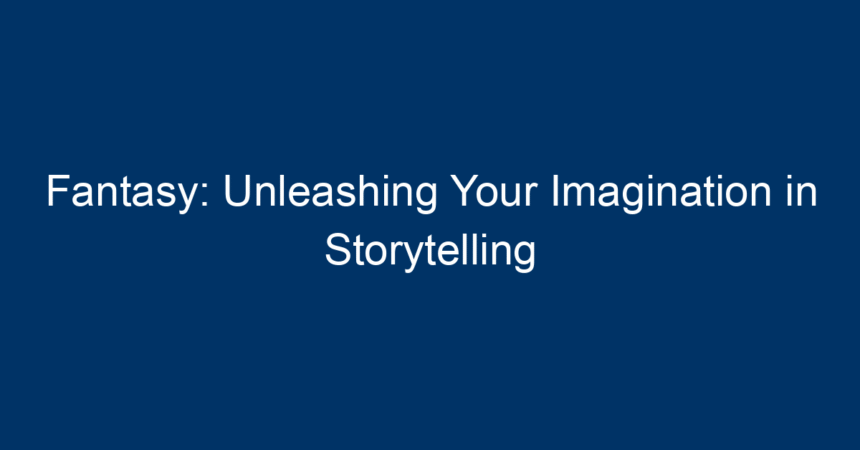Fantasy is more than just a genre—it’s a rich tapestry woven from the threads of imagination, culture, and human experience. By venturing into realms where the impossible becomes possible, storytellers captivate audiences with tales that inspire, provoke thought, and transport readers to unimaginable worlds. This article explores the significance of fantasy in storytelling, from its historical roots to its modern adaptations, infused with practical insights for aspiring writers.
The Essence of Fantasy
When we discuss fantasy, we delve into narratives that transcend the ordinary. This genre typically includes elements such as magical creatures, mythical landscapes, and an overarching sense of wonder. But what truly defines fantasy storytelling?
Defining Fantasy
Fantasy stories often break the rules of reality. They invite readers to suspend disbelief and embrace a world where dragons soar, wizards wield magic, and heroes embark on epic quests. The genre often encompasses subcategories, including:
- High Fantasy: Set in entirely fictional worlds (e.g., J.R.R. Tolkien’s “The Lord of the Rings”).
- Urban Fantasy: Blending magical elements with contemporary settings (e.g., Neil Gaiman’s “Neverwhere”).
- Dark Fantasy: Incorporating horror elements into fantasy narratives (e.g., Clive Barker’s works).
Understanding these subgenres can help writers tailor their stories and connect with specific audiences.
The Historical Roots of Fantasy
The roots of fantasy storytelling can be traced back to ancient myths and legends, which were often used to explain natural phenomena or impart moral lessons. From Greek mythology to the tales of King Arthur, these narratives served essential societal roles. This rich history continues to influence contemporary fantasy literature.
Mythology and Folklore
Many modern fantasy stories are steeped in mythology. Characters such as gods and heroes reflect ancient archetypes, allowing readers to explore universal themes. For example, the hero’s journey—a common framework in fantasy—mirrors the epic quests found in mythological tales.
The Influence of Romanticism
The Romantic era of the 18th and 19th centuries significantly impacted the fantasy genre. Authors like Mary Shelley and Edgar Allan Poe emphasized emotion, nature, and the sublime, shaping how stories were told. This laid the groundwork for modern fantasy, fostering imagination and creativity.
The Elements of Fantasy Storytelling
To write captivating fantasy narratives, aspiring authors must master specific elements that make these stories compelling.
World-Building
World-building is the cornerstone of fantasy storytelling. A well-constructed universe enhances reader immersion, making the tale more believable and engaging. Consider the following components:
- Geography and Climate: Create diverse landscapes, from enchanted forests to sprawling deserts.
- Cultures and Societies: Develop unique customs, languages, and belief systems that reflect your world’s history.
- Magic Systems: Define the rules of magic. Is it rare or common? What are its limitations?
Characters that Resonate
Characters are the heart of any story. In fantasy, they often embody archetypes, which readers can instantly recognize and connect with.
- The Hero: The protagonist usually faces significant challenges, often growing and evolving throughout the narrative.
- The Mentor: This character provides guidance, often possessing vast knowledge or experience.
- The Antagonist: A compelling villain drives conflict, posing obstacles that the hero must overcome.
Conflict and Resolution
Conflict is vital for storytelling. In fantasy, this can manifest in epic battles, personal struggles, or moral dilemmas. Consider these angles:
- Internal Conflict: Characters may struggle with their identity, morals, or desires.
- External Conflict: This typically involves battles between good and evil, often portrayed through larger-than-life characters and stakes.
The Modern Landscape of Fantasy
In the digital age, fantasy storytelling has evolved significantly. With the rise of social media, self-publishing, and streaming platforms, more voices are joining the narrative landscape.
Digital Platforms and Accessibility
Platforms like Wattpad and Kindle Direct Publishing have democratized the writing process, allowing authors to share their work directly with readers. This accessibility has led to a surge of diverse voices, enriching the genre with fresh perspectives and innovative ideas.
The Impact of Film and Television
Recent adaptations of fantasy works, such as “Game of Thrones” and “The Witcher,” have brought the genre to mainstream audiences. These adaptations broaden the reach of fantasy narratives and introduce new fans to the literature.
Writing Tips for Aspiring Fantasy Authors
If you’re eager to embark on your fantasy writing journey, consider the following actionable insights:
Embrace Your Imagination
Allow your creativity to flourish. Write freely without self-judgment in your initial drafts. Your inner critic can take a break—this is the time to explore.
Read Widely Within the Genre
Immerse yourself in various fantasy works, paying attention to different styles, structures, and themes. Understand what resonates with you and what doesn’t. Analyze the techniques used by your favorite authors and consider how you can incorporate similar elements into your own writing.
Develop a Writing Routine
Consistency is key in honing your craft. Set aside dedicated time each day or week to write. Establishing a routine can help keep your imaginative juices flowing.
Seek Feedback
Join writing groups or workshops where you can share your work with others and receive constructive criticism. Engaging with fellow writers can provide valuable insights and support.
Experiment with Your Style
Fantasy offers endless possibilities. Don’t be afraid to explore various narrative techniques or experiment with voice and perspective. Challenge yourself to push boundaries and create something unique.
Revisit and Revise
Writing is rewriting. Don’t shy away from editing your work. Revisit your drafts with fresh eyes, and be open to making substantial changes to enhance your narrative.
Conclusion: The Endless Potential of Fantasy
Fantasy storytelling unlocks doors to boundless creativity, allowing writers to shape worlds, characters, and narratives limited only by their imaginations. As you embark on your own journey into the realm of fantasy, remember that the most engaging stories often reflect the human experience—infused with challenges, triumphs, and the quest for identity.
Whether your story takes place in a mystical kingdom, a bustling urban landscape, or a dark and mysterious realm, the essence of fantasy provides the canvas for you to express your unique vision. Embrace the art of storytelling, unleash your imagination, and let your fantasy world come to life.




